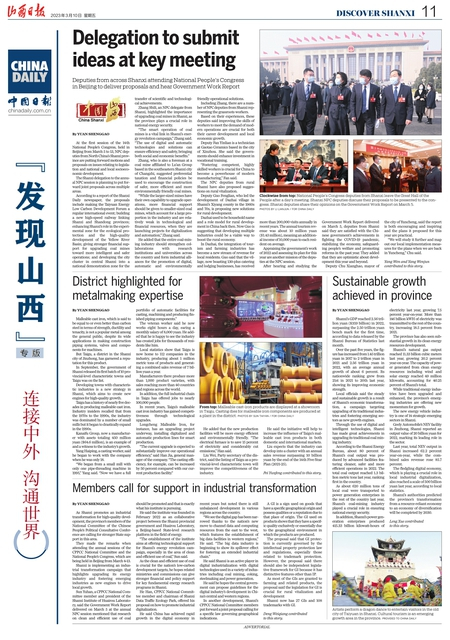Members call for support in industrial transformation
As Shanxi promotes an industrial transformation for high-quality development, the province's members of the National Committee of the Chinese People's Political Consultative Conference are calling for stronger State support in this area.
They made the remarks when attending the annual sessions of the CPPCC National Committee and the National People's Congress, which are being held in Beijing from March 4-13.
Shanxi is implementing an industrial transformation campaign that highlights upgrading its energy industry and fostering emerging industries as new engines to drive local growth.
Sun Yuhan, a CPPCC National Committee member and president of the Shanxi Institute of Huairou Laboratory, said the Government Work Report delivered on March 5 at the annual NPC session mentioned that research on the clean and efficient use of coal should be promoted and that is exactly what his institute is pursuing.
He said the institute was founded in February 2022 as a collaborative project between the Shanxi provincial government and Huairou Laboratory, a Beijing-based State-level research platform in the field of energy.
"The establishment of the institute aims at offering technological support for Shanxi's energy revolution campaign, especially in the area of the clean and efficient use of coal," Sun said.
As the clean and efficient use of coal is crucial for the nation's low-carbon development targets, he hopes related ministries and commissions can give stronger financial and policy support for key fundamental energy research programs in Shanxi.
He Han, a CPPCC National Committee member and the chairman of Shanxi Data Traffic Ecology Park, offered his proposal on how to promote industrial digitalization.
He said China has achieved rapid growth in the digital economy in recent years but noted there is still unbalanced development in various regions across the country.
"We see the digital gap has been narrowed thanks to the nation's new move to channel data and computing resources from the east to the west, which features the establishment of big data facilities in western regions," He said. "The big data industry is beginning to show its spillover effect for fostering an extended industrial chain."
He said Shanxi is an active player in digital industrialization with digital technologies used in a variety of industries including coal mining, coking, steelmaking and power generation.
He said he hopes the central government can propose guidelines for the digital industry's development in China's central and western regions.
In another development, Shanxi's CPPCC National Committee members put forward a joint proposal calling for a specific law governing geographical indications.
A GI is a sign used on goods that have a specific geographical origin and possess qualities or a reputation due to that place of origin. The GI used on products shows that they have a specific quality exclusively or essentially due to the geographical environment in which the products are produced.
The proposal said that GI protection is currently governed by the intellectual property protection laws and regulations, especially those related to trademark protection. However, the proposal said there should also be an independent legislative framework for GI because it has distinctive features other than IP.
As most of the GIs are granted to farming and related products, the proposal said the legislation for GI is crucial for rural vitalization and development.
Shanxi now has 27 GIs and 108 trademarks with GI.
Deng Weiqiang contributed to this story.
By Yuan Shenggao











